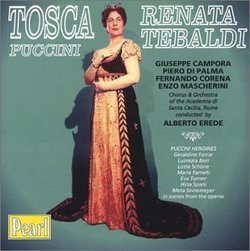| All Artists: Giacomo Puccini, Alberto Erede, Saint Cecilia Academy Orchestra, Santa Cecilia National Academy Orchestra Rome, Renata Tebaldi, Enrico Caruso, Tito Schipa, Antonio Sacchetti, Enzo Mascherini, Eva Turner, Fernando Corena, Geraldine Farrar, Giovanni Volante, Giuseppe Campora, Hina Spani, Lotte Schoene, Lucrezia Bori, Maria Farneti, Meta Seinemeyer, Piero de Palma Title: Puccini: Tosca Members Wishing: 1 Total Copies: 0 Label: Pearl Original Release Date: 1/1/1952 Re-Release Date: 8/26/2003 Genre: Classical Styles: Opera & Classical Vocal, Historical Periods, Modern, 20th, & 21st Century Number of Discs: 2 SwapaCD Credits: 2 UPC: 727031019923 |
Search - Giacomo Puccini, Alberto Erede, Saint Cecilia Academy Orchestra :: Puccini: Tosca
 | Giacomo Puccini, Alberto Erede, Saint Cecilia Academy Orchestra Puccini: Tosca Genre: Classical
|
Larger Image |
CD Details |
CD ReviewsThe Best Of The Best: A Tosca For All Time 01/25/2005 (5 out of 5 stars) "I am honored, deeply honored to make the first review for this sublime recording. Why has no one reviewed it yet ? Has no one listened to it ? IT'S AMAZING. This at last is the greatest Tosca ever made. Now, as an opera buff, I am aware of the eternal rivalry between fans of Maria Callas and fans of Renata Tebaldi. When will it come to an end ? Tebaldi and Callas were never really rivals. They may not have been the best of friends but they must have respected each other as fellow artists. They were two different interpreters of the same repertoire, two different voices for the same characters. They had different temperaments but each a great singer in her own right. The truth is they were both la creme de la creme of the opera scene in the 50's and 60's, the immediate Post World War II period, when recording albums were being released commercially for the first time and when the likes of Karajan was still a young conductor. This old recording (50's ? 60's ?) finds Tebaldi in her prime and in a sensational, electrifying performance as Tosca. Immediately, critics compare this to the ever popular edition with Callas/Di Stefano/Gobbi. But the truth is this album is in a class of its own. While the Callas/Gobbi version remains a kind of old document of powerful drama, this is a combination of both beautiful singing and thrilling, intense acting, especially by the part of bass/bariton Piero Di Palma as Scarpia. While he is not as nasty as Tito Gobbi, he exudes a dark subtle sensuality and lust that can frighten anyone. He shows us his dark, base character in the lines of Dietrich Fischer Dieskau's Scarpia. This is a great album that should be in everyone's collection. Fans of Tebaldi of course will be pleased.
Reneta Tebaldi (she died last month December of 2004) is terrific and there will never be a great singer like her again. Her passing marked the end of an era. She was definately one of the greatest singers of the opera scene in the Post World War II period in the 20th entury. As Tosca, she has a regial flair, a powerful intensity and beautiful lyric splendor. She emphasizes the beauty in such scenes as her duets with Mario, her Prayers, her melancholy aria "Vissi D'Arte". A lot of Tosca's arias are beautiful, we must not forget. It calls for pianissimos and lyric control of breath. In many was she is like Montserrat Caballe in this sense, who bathed her singing with the most gorgeous pianissimi and lyricism beloved by all. Tebaldi's legato comes through smoothly and cleanly. As for her intense lines and more dramatic parts - the scene in which she stabs Scarpia, "Questo il becio di Tosca!" (This is Tosca's kiss!)..Muori Dannato Muori ! (Die you damned man die!) and (Avanti a lui tremaba tutti Roma- all Rome trembled at him)..she executes this intense power with dramatic conviction, the equal to Maria Callas, Birgit Nilsson and Leontine Price who each performed Tosca with great aplomb. Her Suicide finale at the top of Castel San Angelo is incredibly climatic. The tenor in the role of Cavaradossi is not well known but he does a decent job as the artist-hero. He may not be among the great Marios that were Placido Domingo, Giuseppe Di Stefano, Franco Corelli, Luciano Pavoratti or Jose Carreras, he is still good to my ears. He comes off as romantic, idealistic, passionate and heroic, even if he doesn't sound defiant. Piero Di Palma is a great Scarpia, with a husky dark tone in his voice. This album is a rare one and a collector's piece. I highly recommend this to fans of Tosca and Renata Tebaldi. " |

 Track Listings (14) - Disc #1
Track Listings (14) - Disc #1